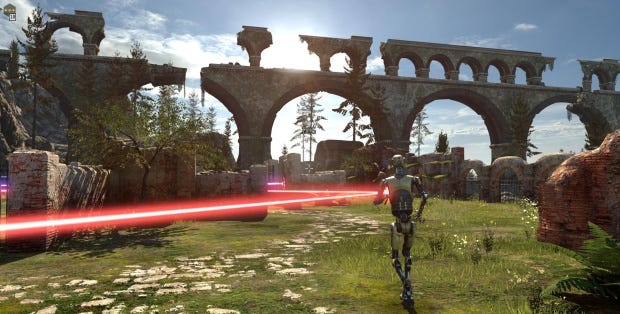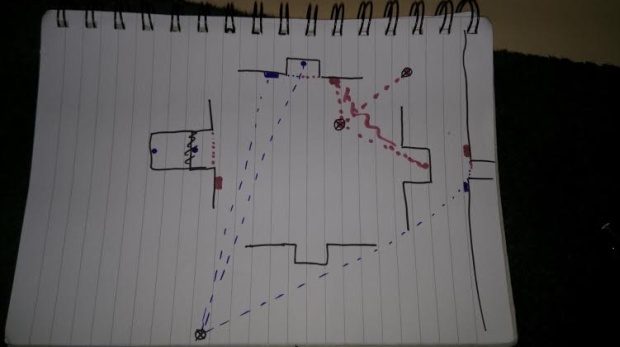Wot I Think: The Talos Principle - Road To Gehenna
Online Bots
The Talos Principle [official site] arrived very late in 2014, such that it erroneously missed out on the Game Of The Year accolades it unquestionably deserved. It had puzzles to match the exquisite Portal 2, and a story which fascinatingly and engagingly explored the philosophy of consciousness and existence. But hurrah, it can now return to our attention some seven months later with the addition of Road To Gehenna - an extensive expansion pack with a whole new story. Here's wot I think:
The Talos Principle saw you play as a person/robot/cyborg/figure-it-out-for-yourself tasked with recovering puzzle pieces (sigils) from a vast collection of first-person outdoor zones, by manipulating patterns of laser beams, electronic gates, powerful fans, and later time-loops and single-player co-op. Along the way you’re given conflicting interpretations of your strange, clearly artificial circumstances, with the god-like omnipotent voice of Elohim contending with the smart-ass voice of Milton on the computer terminals. And in both elements, you’re asked to think.
Alongside the puzzling chops so stunningly revealed by Serious Sam creators Croteam, writers Tom Jubert and Jonas Kyratzes both return for story duty on this expansion, meaning – happy day – we’ve got not just more, tougher, more elaborate puzzles, but another deep and ingeniously delivered story to delve into. And if you’ve finished Talos, you’ll likely be wondering how.
Gehenna takes place parallel to the events of Talos, but elsewhere in the strange, glitchy realms. Ever wondered what happened to some of the other inhabitants who’d been leaving those QR codes? It turns out Elohim has been banishing a number of them to another part of the world, and imprisoning them within puzzles. In these last days, he’s recognised that this was a mistake, and asks you – Uriel – to free them. But do they want to be freed?
This means a new collection of challenges that pick up where Talos’s left off. Which is to say: they’re hard. Of the first group of four, you’ll find yourself pushed to make judicious and austere use of laser connectors in a way that would have felt utterly impossible without the education of the main game, and attempting to perform familiar tricks with fans, blocks, and connectors across a huge, sprawling landscape rather than a confined area.
And wow, the puzzles are good. When I say tougher, it’s in the best possible way: far more thoughtful, rather than far more fiddly. Where Talos’s challenges got a little too over-complicated at times, here it’s really focused on those glorious times of staring at the puzzle pieces you’ve got, and the board you have to place them on, and thinking and experimenting and thinking until flashes of inspiration arrive and a new possibility can be tested. At one point I ended up drawing out an attempt at a top-down version of the seemingly simple layout, in an effort to work out what possible layout of just three connectors could make a pattern complex enough to complete it.
I’ve declared out loud (jokingly, I stress), “If this works it means I’m the cleverest person in the universe,” and, “Oh my goodness, I am a GENIUS!”. As is abundantly obvious, I’m not a genius, but it’s so great to feel so very, very brilliant for those short moments. Puzzle games that can achieve that silly high are very rare, and this expansion keeps dishing it out.
This does include two more of the time-loop puzzles. Clearly tastes vary here, but I found these to be the most frustrating sections of Talos, requiring my brain to think far too far ahead of itself, and in too many directions. (I don’t think I would ever have gotten past that final tower puzzle without a guide, even if given an infinity.) Although practice means they’re slightly less daunting this time out (perhaps I’ve gone ahead of myself and helped myself solve them?), and they’re better mixed into the more entertaining aspects of linear puzzle techniques. It remains the case that I look at the puzzle entrance signs for that little triangular play symbol, and sigh with relief when it’s not there.
But why are you there? It turns out that within their prisons, each cyborg/robot (let’s say “candidate”) has a computer terminal, and their incarceration has led to an “online” community springing up amongst them. Using bulletin boards, and access to extremely limited resources of human history, a culture has formed among them – a culture that rather pointedly satirises both online communities and the pseudo-sincerity and severity limited access to information tends to create.
They have ASCII-based art exhibitions, short-story writing competitions, and amongst their discussions appear superbly observed tropes of forum life. As you solve puzzles, you gain access to more threads, and older threads update, letting you delve further into the microcosm of their shared experiences.
As a commentary on forum culture, it’s caustic and brilliant. Making literal those all-too-familiar colonies where limited information informs cast-iron opinion, it bites hard.
And because I’m an arsehole, I especially love the genuinely cruel mockery of self-congratulatory communities’ praising each other’s mediocrity. An ongoing adventure series written by one character, MAC - called The Adventures Of Jefferson Goldboom In The 9th Dimension – is on its 125th edition, and is wonderfully terrible. Genuinely horrible writing, but trying so, so hard, perfectly spoofed. “Jefferson adjusted his guitar, as he always did when deep in thought. Suddenly his face lit up with understanding. ‘Of course! When I invented and played the ninth chord to defeat the Wizard of Crime, I must have set off a harmonic vibration that expanded the dimensional continuum!” And then the others, praising it, unironically enjoying it, encouraging it. And I know I should feel bad about enjoying seeing things like this mocked, but, like I say, I’m an arsehole.
It also contains a whole bunch of short text adventures written by the inhabitants, as well as strange tests to take. The writing, even when it’s deliberately bad, is consistently brilliant.
The expansion is rather hilariously described by Croteam as four hours long. I suspect that would be four hours if you already knew all the answers. I’ve been plugging away at it for a couple of days, and still have a few to go. And I’m certainly not even close to collecting the extra difficult stars. (I’m not proud, I’m waiting for some hints to appear for that.)
It is, as you’d expect from the Serious Engine 4, ludicrously pretty, and pleasingly nippy. The four zones pick up on the themes of the former game, but pleasingly twist on them, creating more anarchic or broken interpretations of sprawling ruins or Egyptian landscapes.
This is really superb. Wonderful new puzzles, not over-complicating or trying to be a level of impossible above what came before, but still offering new challenges and new scope for the same tools. And a whole new story that lives within Talos’s original, but is communicated entirely through community discussion, and feels extremely reactive to the dialogue choices you make. It’s everything you could want an expansion to be.
Road To Gehenna is out now on Steam, for £10.








